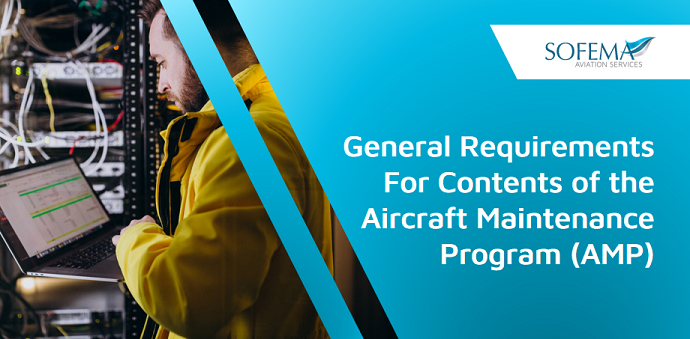Sofema Aviation Services (SAS) www.sassofia.com considers the structure and format of the Aircraft Maintenance Program (AMP)
Ref – Appendix I to AMC M.A.302 and AMC M.B.301(b) — Content of the maintenance programme – ED Decision 2020/023/R
General Requirements For Contents of the Aircraft Maintenance Program (AMP)
The maintenance programme should contain the following basic information:
- The type/model and registration number of the aircraft, engines, and, where applicable, auxiliary power units and propellers.
- The name and address of the owner, operator or CAMO managing the aircraft airworthiness.
- The reference, the date of issue and issue number of the approved maintenance programme.
A statement signed by the owner, operator, or CAMO managing the aircraft airworthiness to the effect that the specified aircraft will be maintained to the programme and that the programme will be reviewed and updated as required:
- Contents/list of effective pages and their revision status of the document.
- Check periods, which reflect the anticipated utilisation of the aircraft. Such utilisation should be stated and include tolerance of not more than 25%. Where utilisation cannot be anticipated, calendar time limits should also be included.
- Procedures for the escalation of established check periods, where applicable and acceptable to the competent authority of registry.
- Provision to record the date and reference of approved amendments incorporated in the maintenance programme.
- Details of pre-flight maintenance tasks that are accomplished by maintenance staff.
- The tasks and the periods (intervals/frequencies) at which each part of the aircraft, engines, APU’s, propellers, components, accessories, equipment, instruments, electrical and radio apparatus, together with the associated systems and installations should be inspected. This should include the type and degree of inspection required.
- The periods at which components should be checked, cleaned, lubricated, replenished, adjusted, and tested.
- If applicable details of ageing aircraft system requirements together with any specified sampling programmes.
- If applicable, details of specific structural maintenance programmes including, but not limited to:
o (supplemental) structural inspection programmes ((S)SIPs or (supplemental) structural inspection documents (S)SIDs) issued by the design approval holder.
o Corrosion prevention and control programmes (CPCPs) taking into account the baseline CPCP issued by the design approval holder.
o For large aeroplanes, maintenance data arising from compliance with the ageing structure requirements of point 26.370 of Annex I (Part-26) to Regulation (EU) 2015/640.
- If applicable, details of Critical Design Configuration Control Limitations together with appropriate procedures.
- If applicable a statement of the limit of validity in terms of total flight cycles/calendar date/flight hours for the structural program
- The periods at which overhauls and/or replacements by new or overhauled components should be made.
A cross-reference to other documents approved by EASA which contain the details of maintenance tasks related to mandatory life and inspection limitations, Certification Maintenance Requirements (CMRs), and ADs
Note: To prevent inadvertent variations to such tasks or intervals these items should not be included in the main portion of the maintenance programme document, or any planning control system, without specific identification of their mandatory status.
Details of, or cross-reference to, any required reliability programme or statistical methods of continuous Surveillance.
A statement that practices and procedures to satisfy the programme should be to the standards specified in the TC holder’s Maintenance Instructions. In the case of approved practices and procedures that differ, the statement should refer to them.
Each maintenance task quoted should be defined in a definition section of the programme.
Next Steps
Sofema Aviation Services & Sofema Online provide EASA Compliant Maintenance Planning Regulatory & Vocational Training – please see the websites or email team@sassofia.com for details
Tags:
AMP, aviation, EASA, EASA Maintenance Planning, SAS blogs, Aircraft Maintenance Program (AMP), AMC M.A.302, AMC M.B.301(b), ED Decision 2020/023/R




